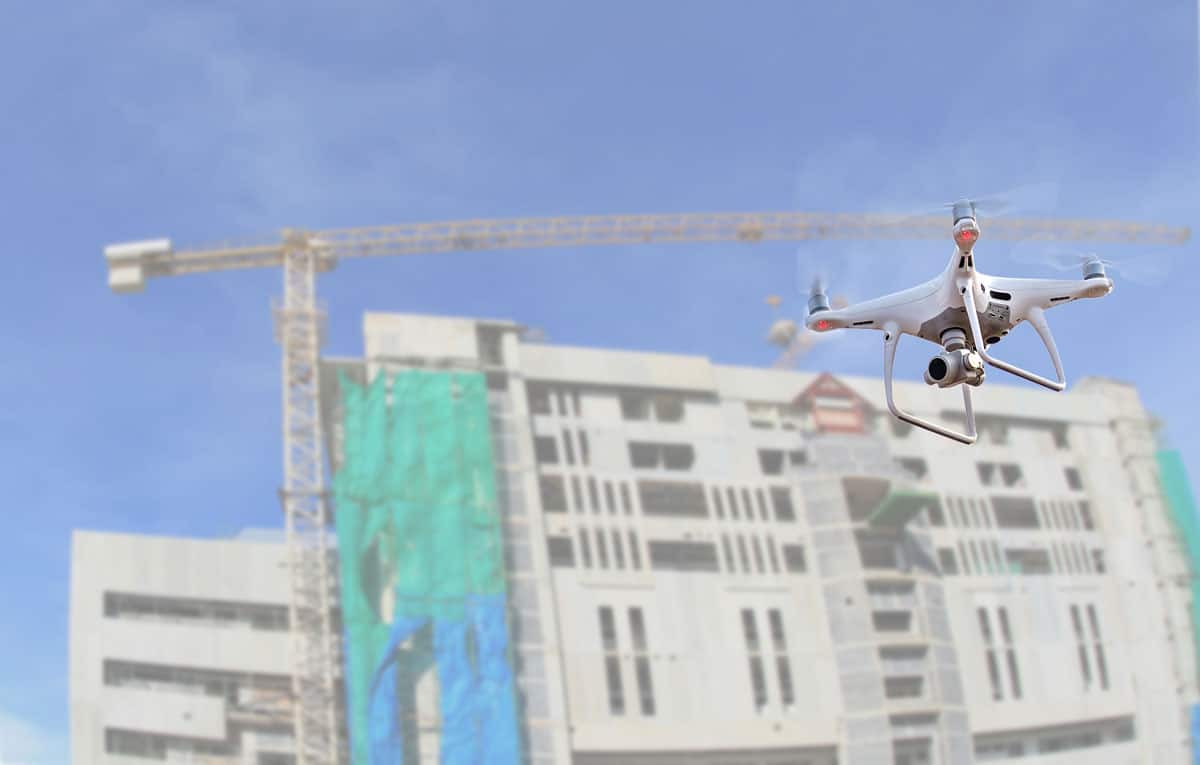The introduction of technology has changed the world drastically. There is no question that over the past thirty years, technology has made a resounding impact on the everyday lives of many. Today, known as the Information Age, the economy is based on technology, a necessity for businesses to get on top and stay on top. The Information Age impacts all industries; albeit slow to adapt, the construction industry is now seeing impacts through the likes of drones, smart buildings, and IoT.
How Can Drones Help on Construction Sites?
Drones, also known as Unmanned Ariel Vehicles (UAVs), are a popular utility when it comes to photography, data collection, and surveillance. Because many drones are equipped with a camera and can be hooked up to smartphones for real-time footage and data feeds, drones have a practical purpose within the world of construction.
For example, drones can collect information from the skies; information that cannot be attained at ground level. UAVs are able to take pictures and videos from above with exceptional resolution. Drones get a closer look at roofs, assess building envelopes, exterior damage, or construction progress with ease. The information collected by drones can identify information as specific as the roof pitch or survey confined spaces. Additionally, construction companies around the United States waste billions of dollars in excess materials each year. With more precise measurements, UAVs offer a more accurate estimate of materials needed for the job.
When it comes to creating models of a site, drones consistently provide more accurate data. By using digital software, drones can scan a building site and map out a precise digital replica, which can then be used to create a 3D model. Most companies create these models to understand the site before, during, and after construction has taken place. With this advanced technology, contractors can plan projects more efficiently and more accurately than ever before.
Though drones come with many benefits, they must also be used with care. UAVs have legal restrictions and companies must abide by federal and state regulations. Drones must be operated by a trained professional. Companies may need to hire a trained professional and supervisor, which can be costly.
Smart Buildings on the Rise
The desire for smart buildings is steadily increasing in today’s business world. Green Technology Media’s Joseph Aamidor reports research from Dell and Intel suggesting 44% of office workers worldwide claim their offices are not smart enough. In addition, 57% believe they will work in a smart office within five years.
So, what is a smart building? This term might make you think of “smart phone” or Disney’s 1999 film “Smart House”. Smart buildings can’t replace your mother or stop your father from dating again, but they can monitor energy consumption, predict maintenance, improve building efficiency, and reduce overall operating costs. Many buildings today have smart features in their HVAC, lighting, fire safety, and security to name a few. A common misconception about smart technology is that it controls itself. Though it may seem that way, the technology is connected to a “smart power grid” known as the internet of things or IoT. Essentially, this is the brain organizing, storing, and redirecting information to and from smart technology that can all be controlled by you, the user.
What can we do with this information being processed? IoT can extend the lives of machines and other operational equipment through self-monitoring. In the long-run, this saves time, money, and a lot of headaches. Additionally, measuring consumption and use can assist in efficiencies that are otherwise unachievable. For example, if motion detectors report that an area of the building is not occupied, it can turn down the heating or air conditioning, lighting, etc. Predictive maintenance and building efficiency are certainly two major benefits of IoT, but it can also monitor indoor air quality which is important for health and safety as well as employee productivity.
Currently, IBM is working on a project called Digital Twin. Using smart technology, products will have a digital replica with identical characteristics and the ability to provide information about the product’s performance and lifespan. The benefits of a digital twin office include preemptive detection of weaknesses in the Wi-Fi connection or deterioration of the building’s structural integrity. Digital twin offices assist in anticipating problems with the building’s electrical, plumbing or HVAC systems as well. Smart technology can predict, self-diagnose, and remedy problems within the building before they negatively impact its occupants.
As with other technological advances, these benefits come with the responsibility of securing the environment. Hackers are everywhere these days, and if someone were to take control of a building, the consequences could be disastrous.
IoT in Construction
As more industries embrace the eco-friendly movement, the demand for green buildings will continue to increase. With an extremely tight workforce, construction efficiency becomes crucial to successfully completing projects. Using a drone is like having an extra set of hands on the construction site. Information collected from the sky provides data that an individual at ground level is unable to gather. Investing in IoT can not only save on operating costs, but it also has the potential to attract new clients and prospective employees. With so many benefits, it’s easy to see why smart buildings are a wise investment (no pun intended… well, maybe).
To learn more about VERTEX’s Construction services, or to speak with a Construction Expert, call 888.298.5162 or submit an inquiry.
AUTHORS
Christian Rogers
Data Management Intern
Eric Sacchetti
Data Management Intern



